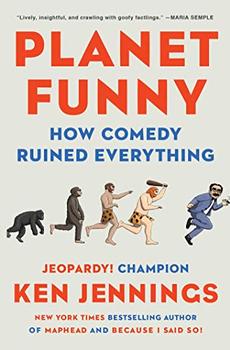Summary | Excerpt | Reviews | Beyond the Book | Readalikes | Genres & Themes | Author Bio

Critics' Opinion:
Readers' Opinion:
First Published:
May 2018, 320 pages
Paperback:
Jul 2019, 320 pages
 Book Reviewed by:
Book Reviewed by:
Norah Piehl
Buy This Book
In 1994, chef Ferran Adrià used a million-dollar investment from a Spanish philanthropist to expand and update the kitchen of his popular Catalonian restaurant elBulli. At the same time, he created an in-house "development squad" to focus on R & D for new culinary "concepts and techniques." The following year, a young Heston Blumenthal bought a run-down sixteenth-century pub in Berkshire and opened a soon-to-be-legendary bistro called the Fat Duck. These two events kick-started the avant-garde cooking movement now called "molecular gastronomy"—using science to prepare foods that no one had ever actually seen before. Not every newly possible dish was a culinary success—just because we have the technology to carbonate gravy or freeze bacon-and-egg ice cream doesn't mean it's a great idea—but for the most part, diners were delighted by the movement's chic novelties. Spherical mango "ravioli" would explode in your mouth like magic bubbles, and intricate little pocket watches of bouillon and gold leaf would melt, Salvador Dalí–style, into glass teapots of soup. The watchword was always surprise. Hey, these look like Oreos, but they're actually tapas made from black olive dough and sour cream! This mandarin orange is full of chicken liver parfait!
Just like a circus act, an avant-garde food menu is designed to elicit laughter and gasps in alternation—and sometimes in combination. I once had a three-hour dinner at Alinea, Grant Achatz's outpost of molecular gastronomy on Chicago's North Side, and the food, though delicious, was completely overshadowed by the showmanship of Achatz's "dinner as theater." The very first course, a butternut squash puree, was served inside a block of ice. A thick glass straw was the only utensil provided, so you couldn't get the puree down without producing a deafening slurping sound designed to draw stares from every other diner in the room. (We were the first table served, and got to enjoy the wave of periodic slurps that circuited the dining room over the next hour.) A hot potato soup was served in a wax cup punctured by a skewer; when the skewer was pulled out, five different cold garnishes would plop into the soup, which you could then down like a shot. Not every dish was slapstick comedy. Some were visual jokes, like the corn/corn-silk/corn-smut combo plated to match a painting hanging in the dining room. Others were semantic, like a "fish and chips" plate where the fish was trout and the chips were... crispier trout. Medallions of lamb served with an array of forty-eight different toppings—choose your own adventure!—seemed like a knowing parody of foodie excess. But nothing was over the top like dessert was over the top: first, a helium-filled balloon made of apple taffy that we were told to suck up in one breath, leaving us sticky and squeaky; next, Achatz's trademark "dark chocolate piñata," which you scoop off the table after a server freezes and then destroys it in front of you.
Does it sound gimmicky? It was absolutely gimmicky. Funny food can't literally taste funny. That wouldn't go over big in a Michelin-starred restaurant. So the humor in high-end cuisine has to come from something incidental to the way a dish tastes, like a surprising texture or the way it's plated. But even so, Achatz and his peers achieved the apparently impossible: wringing laughs from the simple, metabolically necessary act of eating. And that perception of "added value" helps when you want people to drop four to five hundred dollars apiece on dinner: laughs are included! At Alinea, that price also includes the wine pairing, which of course makes everything seem funnier.
It's interesting that there doesn't seem to be a single overarching cultural shift behind the race toward funny. In each of these four case studies, the push for more and more humor was powered by something completely different. In art, it was driven by mechanization. The invention of photography lifted from artists the responsibility of mimicking reality on canvas, and allowed them access to a broader palette of approaches and effects—humor among them. The change in sports came from technology as well, but this time from the invention of modern media culture. Mass media created an instant demand for athletes whose ability to entertain a home audience was just as important as whether they won or lost. The irreverent comic books of the same era were mostly a symptom of the growing cultural influence of youth. Baby boom America had just invented the teenager, and that new market demanded its own light entertainment, with comedic markers that would differentiate it from the routine, serious world of working adults. Funny food at the end of the century felt like something a little more ominous: a decadent sign of the fin de siècle, like Roman elites feasting on roast peacock and hummingbird tongues while civilization collapsed around them. But all these trends eventually converged into one spot: a rising tide of comedy, everywhere we looked.
Excerpted from Planet Funny by Ken Jennings. Copyright © 2018 by Ken Jennings. Excerpted by permission of Scribner. All rights reserved. No part of this excerpt may be reproduced or reprinted without permission in writing from the publisher.





The Funeral Cryer by Wenyan Lu
Debut novelist Wenyan Lu brings us this witty yet profound story about one woman's midlife reawakening in contemporary rural China.
Your guide toexceptional books
BookBrowse seeks out and recommends the best in contemporary fiction and nonfiction—books that not only engage and entertain but also deepen our understanding of ourselves and the world around us.